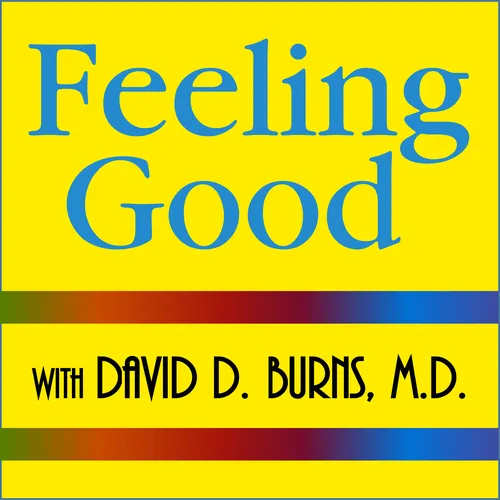
Feeling Good Podcast | TEAM-CBT - The New Mood Therapy
This podcast features David D. Burns MD, author of "Feeling Good, The New Mood Therapy," describing powerful new techniques to overcome depression and anxiety and develop greater joy and self-esteem. For therapists and the general public alike!
- Update frequency
- every 7 days
- Average duration
- 57 minutes
- Episodes
- 478
- Years Active
- 2016 - 2025

017: Ask David — Dare to be “average”—The perfectionist’s script for self-defeat
David answers a challenging question posed by a listener:
Dear Dr. David:
In your Feeling Good Handbook, you suggest that the reader just allows himself or herself to be an ordinary person instead of…

016a: Special Interview: Can Depression and Anxiety Be Treated in a Two-Hour Therapy Session? with Lisa Kelley
David and Fabrice are joined by Lisa Kelley, a certified TEAM-CBT therapist and former journalist from Littleton, Colorado. Lisa interviews David about an interview / blog David has just published on…

016: Ask David — How can I cope with a complainer? How can I help a loved one who is depressed?
How can you help a depressed friend or family member? You may be surprised to discover that the attempt to “help” is rarely effective, and may even make the problem worse. In contrast, the refusal to…

015: The Five Secrets of Effective Communication (Part 2)
If used skillfully, the Five Secrets can resolve nearly any relationship conflict and transform hostility, resentment and mistrust into intimacy and warmth, often with amazing speed. And although thi…

014: The Five Secrets of Effective Communication (Part 1)
Practically all of us have a friend, colleague, client, customer or family member we aren’t getting along with very well. Perhaps the difficult person in your life is excessively critical of you, com…

013: Ask David — Is Anxiety Inevitable?
A fan points out that many of the examples in David’s book, When Panic Attacks, are high functioning individuals with lots of education and good jobs. She asks Dr. Burns if depression and anxiety are…

012: Negative and Positive Distortions (Part 3)
Discuss of "Should" Statements, Labeling, and Blame. Dr. Burns brings these distortions to life with a case of a severely depressed woman who felt profoundly guilty and devastated after her brother’s…

011: Negative and Positive Distortions (Part 2)
Three common distortions: Jumping to Conclusions (including Mind-Reading and Fortune-Telling), Magnification and Minimization (also called the Binocular Trick), and Emotional Reasoning.

010: Negative and Positive Distortions (Part 1)
Common thought distortions that trigger negative feelings: All-or-Nothing Thinking, Overgeneralization, Mental Filter, and Discounting the Positive.

009: Should I Try to Be Happy All the Time? Healthy vs. Unhealthy Emotions
When we’re feeling depressed, anxious, or angry, should we accept our feelings or try to change them?

008: M = Methods (Part 2) — You Can CHANGE the Way You FEEL
A session with a severely depressed, suicidal, hospitalized woman with rapidly cycling bipolar illness, who’d had 15 years of failed treatment with drugs and psychotherapy.

007: M = Methods (Part 1) — You FEEL the Way You THINK
The three basic principles of CBT:
- Negative feelings, like depression, anxiety, and anger, do not result from what happens to us, but rather from our thoughts about what’s happening. In fact, our th…

006: Ask David — Identity Crisis; Finding a CBT Therapist; Love Me the Way I Am
Responses to questions submitted by listeners:
- What causes an “identity crisis?” And how do you treat it?
- Why is it so hard to find a therapist trained in cognitive therapy?
- In a relationship, shoul…

005: A = Agenda Setting (Part 2) — How to Overcome Therapeutic Resistance: “Dr. Burns, I think I need help with my low self-esteem!”
Dr. Burns suddenly abandons the role of healer and instead assumes the role of the patient’s angry, paranoid and defiant resistance.

004: A = Agenda Setting (Part 1) —The Eight Most Common Forms of Therapeutic Resistance
What is therapeutic resistance? You will find out that therapeutic resistance is NOT what you were taught in graduate school or read about in the writings of Sigmund Freud! You will also discover why…

003: E = Empathy — Does It Really Make a Difference?
- How an encounter with a patient with paranoid schizophrenia dramatically changed the course of his career
- The 5 Secrets of Effective Communication
- How to talk with your EAR
Dr. Burns also discusses…

002: T = Testing — A Boring Topic with Exciting Implications
In this podcast, Dr. David Burns describes the “Testing” part of the T.E.A.M. model. Topics include:
- The shocking results of a study of therapist accuracy at Stanford
- Why therapists who don’t test u…

001: Introduction to the TEAM Model
In this podcast, Drs. Fabrice Nye and David Burns discuss an exciting breakthrough in psychotherapy.
Leave your questions and comments below. Also, let us know if you’d like to see certain topics add…